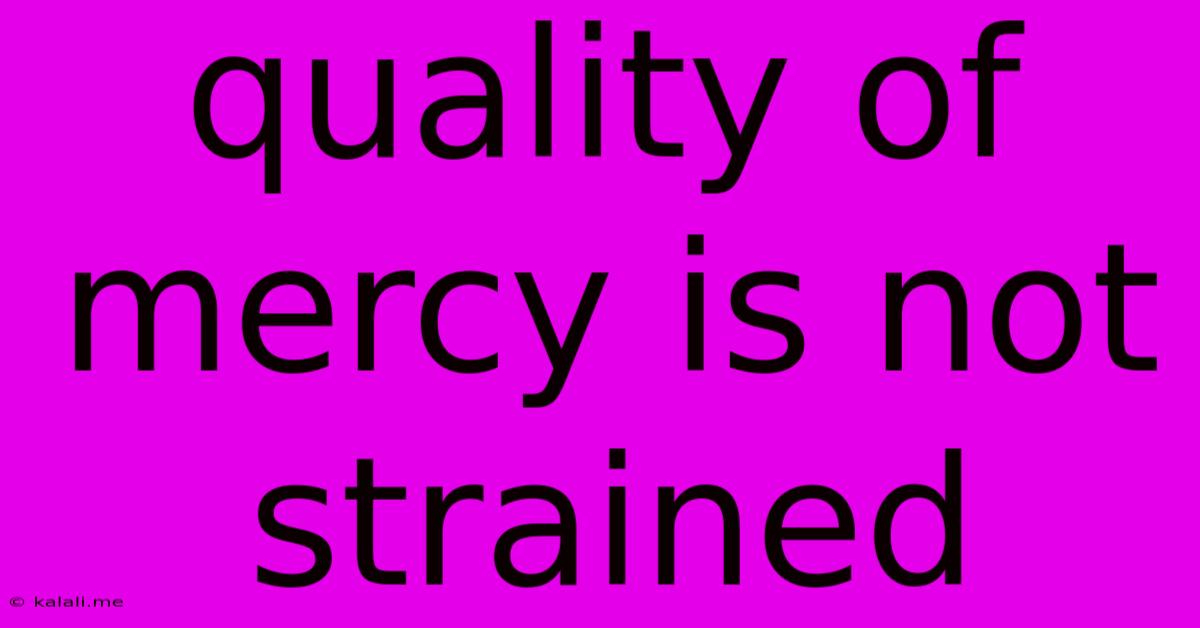Quality Of Mercy Is Not Strained
Kalali
May 19, 2025 · 3 min read

Table of Contents
The Quality of Mercy: Not Strained, but Freely Given
Shakespeare's immortal line, "The quality of mercy is not strained," from The Merchant of Venice, speaks volumes about the profound nature of compassion and forgiveness. This seemingly simple phrase encapsulates a complex concept with far-reaching implications for individuals, societies, and even our understanding of justice. This article will delve into the meaning of this powerful quote, exploring its relevance in contemporary life and examining its enduring legacy.
Understanding the Context: Mercy in The Merchant of Venice
Within the play, Shylock, a Jewish moneylender, demands a pound of flesh from Antonio, a Christian merchant, as payment for a defaulted loan. Portia, disguised as a lawyer, ultimately saves Antonio by cleverly exploiting a loophole in Shylock's contract. However, it's not simply legal maneuvering that resolves the conflict; it's the plea for mercy that resonates most deeply. Portia's appeal to Shylock to show mercy highlights the inherent value of compassion. The line itself emphasizes that true mercy isn't forced or coerced; it's a voluntary act, a freely given gift.
The Essence of Unstrained Mercy:
The phrase "not strained" suggests that genuine mercy isn't something that can be wrung out or extracted. It isn't a begrudging concession, a reluctant act performed under duress or obligation. Instead, it flows naturally from a place of empathy, understanding, and a willingness to forgive. This implies several key characteristics of true mercy:
- Voluntary: It's a conscious choice, not a response to external pressure.
- Compassionate: It stems from a deep understanding of the suffering of others.
- Forgiving: It involves letting go of resentment and anger.
- Generous: It's an act of selfless giving, without expectation of reward.
Mercy in the Modern World:
The concept of unstrained mercy remains critically relevant in today's world, marked by increasing polarization and conflict. In an era defined by social justice movements, political divides, and personal grievances, the ability to extend mercy—to forgive and understand—is more vital than ever. From individual relationships to international relations, the application of this principle can foster reconciliation, healing, and lasting peace.
Applying the Principle of Unstrained Mercy:
How can we cultivate this quality in our own lives? Consider these points:
- Practice empathy: Try to see situations from others' perspectives.
- Cultivate forgiveness: Let go of grudges and resentment. This doesn't mean condoning harmful actions, but rather releasing the emotional burden they carry.
- Act with compassion: Show kindness and understanding, even to those who have wronged you.
- Promote restorative justice: Where possible, prioritize solutions that focus on healing and reconciliation rather than simply punishment.
Conclusion: A Legacy of Compassion
Shakespeare's "The quality of mercy is not strained" serves as a timeless reminder of the power of compassion and forgiveness. It's a call to action, urging us to cultivate a spirit of mercy that is freely given, not forced, and to understand that true justice involves more than just punishment; it encompasses healing, reconciliation, and the transformative power of understanding. In a world often defined by its harshness, the pursuit of unstrained mercy remains a beacon of hope and a pathway to a more just and compassionate future.
Latest Posts
Latest Posts
-
Catch Ya On The Flip Side
May 19, 2025
-
The Multi Part Identifier Could Not Be Bound
May 19, 2025
-
Bash Check If Variable Is Set
May 19, 2025
-
Dreams Are Messages From The Deep
May 19, 2025
-
Ml In Large Glass Of Wine
May 19, 2025
Related Post
Thank you for visiting our website which covers about Quality Of Mercy Is Not Strained . We hope the information provided has been useful to you. Feel free to contact us if you have any questions or need further assistance. See you next time and don't miss to bookmark.